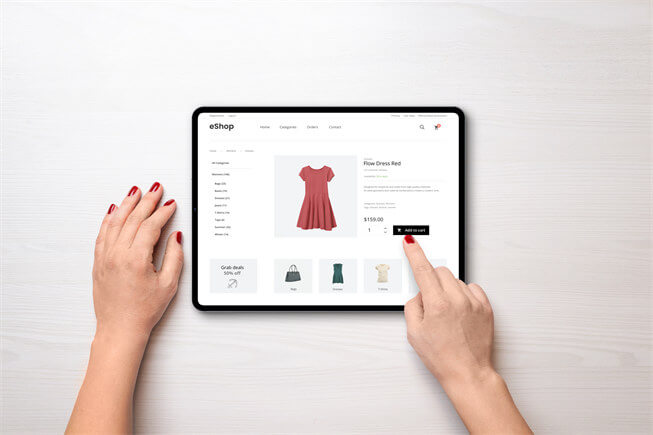Today’s creators and influencers have the opportunity to make money from their content by selling it on digital storefront. A seamless shopping experience and the full potential of an online business depend on selecting the correct e-commerce platform. This article explores important criteria to take into account when selecting an e-commerce platform, such as particular needs, functionality, scalability, user experience, and payment choices.
Additionally, we recommend 7 potent platforms that effortlessly connects social media accounts with your online marketplaces. Let’s work together to maximize your online storefront’s potential.
Understanding the importance of choosing the correct E-Commerce platform

Selecting the appropriate e-commerce platform is one of the most important choices you’ll have to make when setting up your digital storefront. Your choice of platform will have an impact on your online store’s functionality, user experience, scalability, and success in the long run. Making an informed choice requires careful consideration of your unique goals and requirements given the wide range of e-commerce platforms accessible. In this post, we’ll look at some important things to think about while selecting the best e-commerce platform for your online store.
Assessing your digital storefront needs
Examining your needs for a digital storefront is crucial before plunging into the sea of e-commerce platforms. Think about things like the size of your online store, how many products you sell, how customizable you want your products to be, and your technological skills. Asses whether you need further capabilities like marketing tools, payment gateways, and inventory management integrations with shipping. You can focus on platforms that meet your demands by focusing on platforms that meet your unique requirements, which will help you narrow down your alternatives.
🔗 Learn How to Turn Visitors into Customers on Digital Storefront
Evaluating platform functionality and features

Functionality and features are important factors to take into account when selecting an e-commerce platform. Look for a platform that provides a user-friendly layout, straightforward navigation, and extensive customization possibilities. Make sure the platform is responsive to mobile devices because a sizable percentage of online purchases are conducted on mobile. To construct a visually beautiful and cohere digital storefront, evaluate the available templates and design alternatives.
Also consider the platform’s ability to integrate with other programs and services, like social media networks, analytics platforms, and email marketing software. Connecting with other providers can improve your marketing initiatives and streamline your company’s operations.
Scalability and growth potential
Your digital storefront has room to expand as a creator or influencer. Selecting an e-commerce platform that can grow with your business is therefore essential. Check the platform’s ability to scale and see if it can handle growing sales, traffic, and product catalog sizes. When choosing a platform, look for one that allows you to modify or customize your store as your company grows. Scalability makes sure that your online storefront can change to meet the changing needs of both your audience and your sector.
Considering user experience and payment options

Your digital storefront’s success depends on the user experience. Your clients should have a flawless and straightforward buying experience thanks to the e-commerce platform you’ve chosen. Check to see if the platform has a quick and easy checkout procedure, a variety of payment alternatives, and reliable payment gateways. Customer satisfaction can be raised and conversion rates can be increased by having a variety of payment options available, such as credit cards, digital wallets, and alternative payment solutions.
To safeguard the private information of your clients and foster trust, don’t forget to assess the platform’s security measures.
Recommended E-Commerce platforms for your digital storefront
Shopify
One of the most well-liked e-commerce platforms, with a user-friendly interface and a complete set of capabilities. It is appropriate for businesses of all sizes because it offers customized themes, secure payment gateways, and numerous app connections.
WooCommerce
WooCommerce is a WordPress plugin that offers seamless interaction with WordPress-powered websites. It provides a large selection of extensions and themes, providing you versatility and control over the look and feel of your online store.
Linkr
An all-in-one platform that supports influencers and creators in developing their e-commerce skills. Utilizing Linkr’s online store feature, creators and influencers can enhance their digital storefronts with ease. Linkr offers a seamless integration of products and services within social media profiles, allowing for a streamlined shopping experience for their audience. With Linkr’s online store, creators and influencers can maximize their monetization efforts and provide a convenient platform for their followers to access and purchase their offerings.

BigCommerce
BigCommerce is a platform that is scalable and built for expanding companies. It offers multichannel selling capabilities, built-in SEO techniques, and a selection of expert themes. It makes sure that customers have a positive experience by placing a big emphasis on security and performance.
Magento
With sophisticated functionality and flexible customization possibilities, Magento is a potent open-source e-commerce platform. It serves companies with extensive product catalogs and intricate needs. Although technical knowledge is necessary, it offers a great deal of flexibility and adaptability.
Squarespace
A well-liked platform for building attractive websites with built-in e-commerce features is Squarespace. It is perfect for creative enterprises and artists since it has lovely templates, is mobile friendly, and has integrated marketing tools.
Wix
Wix is an easy-to-use platform that enables you to construct an online store with a professional appearance using drag-and-drop. It provides templates that may be customized, safe payment methods, and interaction with well-known marketing tools.
🔗 Explore 25 Must-Have Digital Marketing Tools to Help Your Online Business Grow
In conclusion, the success of your online business depends on selecting the best e-commerce platform for your digital storefront. Think about your unique requirements, examine platform functionality and features, evaluate scalability and expansion possibilities, and give user experience and payment alternatives first priority. Also, consider the advantages of using Linkr to improve the efficiency and traffic of your online store.
Read more:
How to Use Social Media to Sell Digital Products Online
The Evolution of Creator Shop: How It’s Changing the Game for Creators
